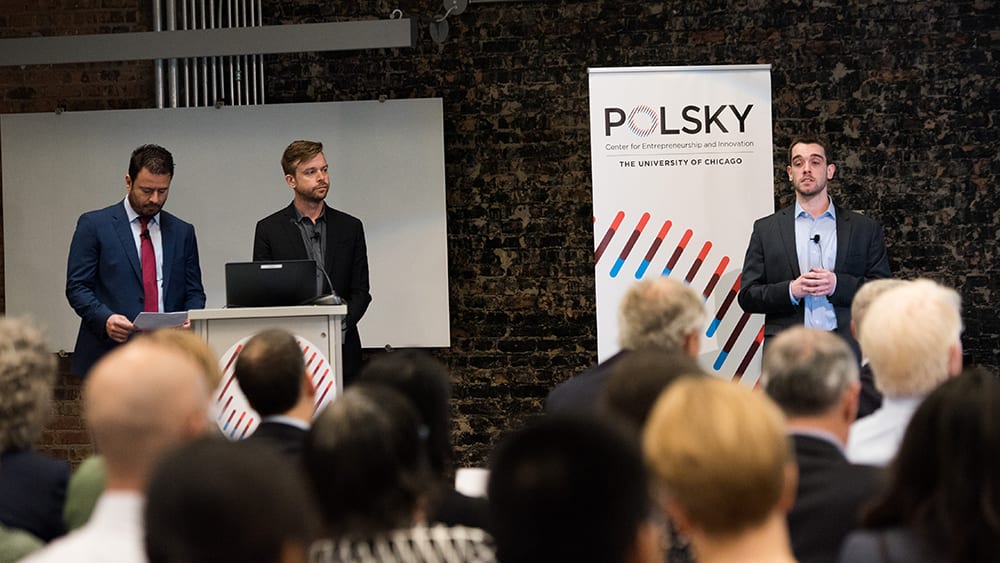
Jul 18, 2018 | Microbiome, Research
by Bethany Hubbard
What we leave behind tells a story, and Jack Gilbert, PhD, is an expert at reconstructing the narrative.
“When you poop, you poop gold in terms of valuable information about what’s going on inside your gut,” said Gilbert, who is a microbial ecologist at the University of Chicago. “And every day, the information in your poop is slightly different. Each day is providing us with a different snapshot of what’s going on inside your body, and having all of that information is immensely valuable.”
Gilbert’s work on the microbiome—the unique collection of microbes that live in each person’s gut—has earned him international recognition and spurred interest in this burgeoning field of research.
Now, through a new start up called BiomeSense, Inc., Gilbert and colleagues are working to commercialize their microbiome research and revolutionize methods for collecting and synthesizing people’s microbial data. The goal: identify and characterize microbes and their behavior in order to uncover better ways to treat disease and maintain health.
“More and more, people are realizing that our microbiome content has a lot to do with our health,” said Savas Tay, PhD, company co-founder and UChicago molecular engineer. “There are all kinds of metabolic diseases, cancers, and psychiatric diseases that are related to the microbiome.”
To better collect this valuable data, Gilbert and Tay developed new technology that analyzes a person’s microbiome through the collection and analysis of, you guessed it, their poop. Tay likens this “biosensor” to a computer chip that channels fluid instead of electricity through its wires. The biosensor can be connected to a toilet, where it extracts DNA from each bacterial cell within a stool sample and regularly sends that data to the cloud.
“So, we are looking to characterize the genetic potential—the functional potential—of the microbiome in your stool every single day in a routine and automated way,” Gilbert said. “We can basically weaponize the microbiome for clinical discovery.”
By generating more data about a person’s microbiome makeup, the pair hope to help physicians tailor more holistic treatment plans that include dietary recommendations in order to maximize the impact of certain drug treatments. For example, a doctor might recommend that a person eat more of a certain fruit because it promotes the growth of a beneficial bacterium that is known to increase the efficacy of a drug they’re taking.
The biosensor can take multiple samples over an extended period of time, which is important because the microbiome is always in flux.
“The composition of your microbes—the 500 to 1,000 different species of bacteria that live inside you—doesn’t really change very much at all,” Gilbert said. “It’s just the relative proportions that do.”
So, a stool sample taken this morning may tell a completely different story from a sample collected tomorrow, or even this afternoon. The biosensors real-time data will allow doctors to revise treatment plans daily.
“You eat something, your microbiome changes. You take a drug, your microbiome changes. You travel, it changes,” Tay said. “So, just measuring it once really doesn’t tell you anything. You need to measure it regularly.”
The BiomeSense team hopes the biosensor will eventually replace current manual methods of collection, which are less than ideal. Not unexpectedly, patients are reluctant to collect their own stool samples and send them into the lab. Plus, the microbiome makeup can be altered during transport, rendering the data unreliable. BiomeSense eliminates these variables.
The team first aims to implement the biosensor in clinical trials before pursuing a consumer product. “In the short term, we’re producing data that can be used to improve how we design drugs and improve the success of drug trials,” Gilbert said.
BiomeSense was recently awarded $250,000 from the University of Chicago’s Innovation Fund and previously received $90,000 in research funding from the Duchossois Family Institute, which will be used to complete a prototype.
“Our next big step is taking it from the bench to actually installing it in a patient home so we can start collecting data,” said company CEO and co-founder Kevin Honaker. “It’s going to take a lot of funding to get there.”
In the future, Gilbert hopes to create a global microbiome database—input a patient’s disease, prescribed drugs, demographics, and environment to determine the exact diet needed to augment their microbiome.
“BiomeSense is the only platform in the world that can generate that kind of information,” Gilbert said. “Nothing else can.”
Bethany Hubbard is associate director for digital communications in the University of Chicago Medicine & Biological Sciences Development office.

Jun 29, 2018 | Big Data, Microbiome, News Roundup, Research
A selection of health news from the University of Chicago and around the globe curated just for you.
Research at Shedd Aquarium explores how environment impacts microbiome of dolphins
Research conducted at the Shedd Aquarium with UChicago revealed new details about the microbiome of Pacific white-sided dolphins at the aquarium and how it is influenced by the surrounding environment. (The Forefront)
Can a daily pill prevent kidney stones?
Hatim Hassan and other researchers at Oxalo Therapeutics are developing a drug that uses the microbiome to prevent kidney stones. (Crain’s Chicago Business)
Viruses love what we’ve done with the planet
The more of the planet humans take over, the more we inadvertently make it a viral paradise, and a dangerous place for us to live. (Quartz)
Probiotic, supplement combo extends fruit fly lifespan
A combination of probiotics and an herbal supplement called Triphala extended the lives of fruit flies by 60 percent, report researchers. (Futurity)
Students and UChicago scientists turn Wrigley Field into data lab
Lane Tech students came to Wrigley Field to help UChicago-Argonne researchers install sensors for Array of Things, a project that collects environmental data. (UChicago News)

May 31, 2018 | Medicine, Microbiome, Research
A selection of health news from the University of Chicago and around the globe curated just for you.
How gut microbes are joining the fight against cancer
Nature dives into how the microbiome influences how well cancer drugs work, including highlights of Tom Gajewski’s work at the University of Chicago. (Nature)
The thing inside your cells that might determine how long you live
You may have forgotten about the nucleolus since you took biology class, but scientists think this structure inside every cell in your body may play an important role in aging. (The New York Times)
Gut check: Is a microbiome imbalance undermining your mental health?
What if, in a way, what’s happening in your gut actually does plays a role in what’s going on in your brain? As it turns out, that’s precisely the case (and vice versa). Jack Gilbert is featured. (U.S. News & World Report)
$35 million NIH funding launches health research accelerator at UChicago
The Institute for Translational Medicine (ITM) will help people live their best lives by making research breakthroughs happen and getting those discoveries into the real world to improve everyone’s health as soon as possible. (The Forefront)
American Gut Project explores our bodies’ microbiomes
The first major results are in from the American Gut Project, a citizen science project to get a better understanding of the microbial communities inside our bodies. (Michigan Radio)

May 16, 2018 | Microbiome
by Kate Dohner
Imagine your vision gradually blurring, from the inside out. When you look at a clock, you see the numbers on the sides but not the hands at the center. Unfortunately, this is not a scenario out of a science fiction movie but instead the experience of the 11 million people in the United States with some form of age-related macular degeneration (AMD), the leading cause of blindness among adults over 50.
AMD occurs when the macula, a small spot near the center of the retina, is damaged. The vision loss may happen slowly for some, more quickly for others. AMD significantly impacts quality of life, making it difficult to read, drive, cook, or even recognize the faces of family and friends.
Despite extensive research, there is currently no cure for AMD, and in the years to come, it is predicted to become even more common as the population ages and people live longer. For those over age 75, the risk of AMD is nearly 30 percent. By 2050, researchers estimate that nearly 22 million people in the US will have AMD.
While we know that multiple risk factors—including aging, genetics, and lifestyle choices, such as smoking and diet—may play a role in the development of AMD, we do not yet understand exactly how they act together to cause the disease. For example, while people with a certain genetic mutation are more likely to develop AMD, not everyone with the mutation gets it, suggesting that there must be another element at play.

Dimitra Skondra, MD, PhD, assistant professor of ophthalmology and visual science (Photo by Jean Lachat)
Dimitra Skondra, MD, PhD, suspects that the gut microbiome (the community of bacteria, fungi, and viruses that inhabit our bodies) is a “missing link” in the development of AMD. Using the digestive diseases research of Eugene Chang, MD, as a model, she seeks to determine if certain gut bacteria—in combination with genetic and lifestyle factors—spur the development of AMD.
Skondra is studying mice raised in a “germ-free” environment (meaning without exposure to any bacteria), as well as mice with a “normal” microbiome, to see how gut bacteria, possibly influenced by diet, affect their visual health. She will also examine mice that are genetically vulnerable to developing AMD in order to assess the role genetics plays in causing the condition.
Because the gut microbiome can easily be manipulated with supplements containing good bacteria (called probiotics), Skondra hopes this research will lead to effective treatments for AMD, along with new strategies for prevention. Thanks largely to support from the Duchossois Family Institute, probiotic treatments are already in development for a number of other diseases.
“Uncovering the causes of AMD could have a huge impact and bring new hope to millions of people,” Skondra says. “The University of Chicago Medicine is the best place to conduct this kind of research. We have the expertise, collaborative culture, and infrastructure to advance understanding of the microbiome’s role in AMD. Philanthropic support can help put us ahead of the game in this effort.”
Skondra envisions a day when patients will no longer face the frightening experience of blurred vision and eventual blindness. Instead, she hopes they will simply be able to take a probiotic pill that corrects—or better, prevents—the heartache of AMD.
Kate Dohner is a senior writer for the University of Chicago Medicine & Biological Sciences Development office.

Apr 30, 2018 | Genetics, Medicine, Microbiome, Vaccination
A selection of health news from the University of Chicago and around the globe curated just for you.
Doctors try to lower $148K cancer drug cost; makers triple price of pill
A group of cancer doctors, including Mark Ratain, found a blood cancer drug called Imbruvica, which typically costs $148,000 a year, could be just as effective at a lower dose. Drug makers found out and introduced a new pricing scheme that ensures dose reductions won’t save patients money or impact company revenue. (The Washington Post)
UChicago startup raises $750K to treat migraines with a nasal spray
Seurat Therapeutics, which will compete in the Polsky Center’s New Venture Challenge this spring, announced Wednesday that it has raised its first round of funding that will allow the company to begin testing their product in human clinical trials. (ChicagoInno)
Specific bacteria in the small intestine are crucial for fat absorption
New research by Eugene Chang and colleagues shows how the typical calorie-dense western diet can induce expansion of gut microbes that promote the digestion and absorption of high-fat foods. (The Forefront)
Genetic screening tool identifies how the flu infiltrates cells
Researchers at UChicago have developed a genetic screening tool—using CRISPR/Cas9—that identified two key factors that allow influenza virus to infect human lung cells. (The Forefront)
Weight might not be why obesity damages knees
The gut microbiome could be the culprit behind arthritis and joint pain that plagues people who are obese, according to a new study from the University of Rochester Medical Center. (Futurity)

Mar 27, 2018 | Microbiome, News Roundup, Research
A selection of health news from the University of Chicago and around the globe curated just for you.
In the battle against cancer, microbes could be the answer
Can your microbiome fight cancer? Evelo Biosciences CEO Simba Gill is working with UChicago cancer expert Thomas Gajewski to find ways to harness microbes against an array of cancers. (WIRED UK)
How trees make people happier and healthier
It’s no surprise that a little nature can go a long way in making people feel better. But the research of UChicago environmental psychologist Marc Berman shows that adding trees to a city can have a significant impact on a person’s health and happiness. (Knowledge Applied podcast)
Gut feelings
This issue of the newsletter μChicago features some of the microbiome work of Eugene Chang and Vanessa Leone, with a fun and informative animation from CNN. (μChicago newsletter)
They don’t make baby poop like they did in 1926, that’s for sure. Here’s why scientists care.
Most of us do our best not to think too much about baby poop. But, as it turns out, stool has a lot more power than we think and that’s true from the first soiled diaper. As Jack Gilbert notes, we need to understand what we can learn from baby’s changing poop to improve our health. (Popular Science)
Immune history influences effectiveness of flu vaccine
New research on why the influenza vaccine was only modestly effective in recent years shows that immune history with the flu influences a person’s response to the vaccine. Flu experts Emily Landon and Allison Bartlett answer questions on Facebook Live. (The Forefront)










